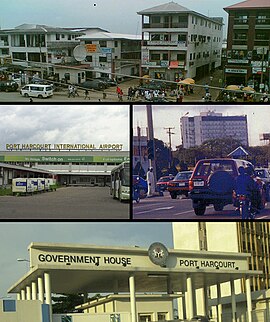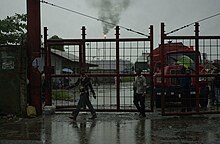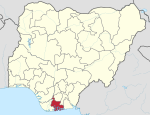Port Harcourt
Port Harcourt
| |
|---|---|
| City of Port Harcourt | |
 Top: A street scene in Port Harcourt Middle: Port Harcourt International Airport, The City Center Bottom: Government House, Port Harcourt | |
| Nickname(s): | |
| Country | |
| State | Rivers |
| LGA | Port-Harcourt, Eleme Ikwerre, Obio/Akpor, Ogu/Bolo, Okrika, Oyigbo, Tai. |
| Incorporated in | 1913[3] |
| Named for | Lewis Vernon Harcourt |
| Government | |
| • Type | Mayor–Council |
| • Body | Port Harcourt City Council |
| • Mayor | Chimbiko Iche Akarolo[4] |
| Area (1980s)[5] | |
| • City | 360 km2 (140 sq mi) |
| Population (2006)[6] | |
| • Urban | 1,382,592 |
| • Metro | 1,947,000 |
| [Note 1][Note 2] | |
| Demonym | Harcourtian[7] |
| Time zone | UTC+1 (WAT) |
| Postcode | 500...[8] |
| Area code | 084[9] |
Port Harcourt (Igbo: Diobu,[10][11] Iguocha[12][13] or Ugwuocha;[14][15][16][Note 3] Pidgin: "Po-ta-kot")[3][Note 4] is the capital of Rivers State, Nigeria. It lies along the Bonny River and is located in the Niger Delta. According to the 2006 Nigerian census Port Harcourt has a population of 1,382,592. The port was built in 1912, but not given a name until August 1913, when the Governor of Nigeria, Sir Frederick Lugard, named it "Port Harcourt" in honour of Lewis Vernon Harcourt, then the Secretary of State for the Colonies.[12][16]
The area that became Port Harcourt in 1912 was before that part of the farmlands of the Diobu village group of the Ikwerre, an Igbo sub-group.[17] The colonial administration of Nigeria created the port to export coal from the collieries of Enugu located 151 miles (243 km) north of Port Harcourt,[18] to which it was linked by a railway called the Eastern Line, also built by the British.[2][18][19]
In 1956 crude oil was discovered in commercial quantities at Oloibiri, and Port Harcourt's economy turned to petroleum when the first shipment of Nigerian crude oil was exported through the city in 1958. Through the benefits of the Nigerian petroleum industry, Port Harcourt was further developed, with aspects of modernisation such as overpasses and city blocks.[3] Oil firms that currently have offices in the city include Royal Dutch Shell and Chevron.[20]
Port Harcourt's primary airport is Port Harcourt International Airport, located on the outskirts of the city; the Nigerian Air Force (NAF) base is the location of the only other airport in the city and is used by commercial airlines Aero Contractors and Virgin Nigeria (now Air Nigeria) for domestic flights.[21]
The main educational establishment in the city is the University of Port Harcourt, and the current Mayor of Port Harcourt is Chimbiko Akorolo.
History
Port Harcourt was founded in 1912 by Frederick Lugard, governor of both the Northern Nigeria Protectorate and the Southern Nigeria Protectorate.[22] Its purpose was to export the coal that geologist Albert Ernest Kitson had discovered in Enugu in 1909.[2][23] The colonial government caused the people of Diobu to cede their land, and in 1912 the building of a port-town was started.[10] Other villages that were later absorbed into the city included Oroworukwo, Mkpogua, and Rumuomasi;[24][25][26] In the creeks to the south of the original port were the fishing camps and grounds of the Okrika-Ijaw group.[16]
During the First World War, Port Harcourt was used as a point for military operations against the Central Powers in German Kamerun.[3][27] After the discovery of crude oil in Oloibiri in 1956, Port Harcourt exported the first shipload from Nigeria in 1958. Port Harcourt became the centre of the Nigerian oil economy[28] and it subsequently reaped benefits of its associations with the petroleum industry by undergoing modernisation and urbanisation.[3] Port Harcourt's growth is further due to its position as the commercial centre and foremost industrial city of the former Eastern Region; its position in the Niger Delta; and its importance as the centre of social and economic life in Rivers State. After the Republic of Biafra seceded from Nigeria in 1967 Port Harcourt fell to Nigerian forces on 19 May 1968. From an area of 15.54 km2 in 1914, Port Harcourt grew uncontrolled to an area of 360 km2 in the 1980s.[5]
Geography and climate

The main city of Port Harcourt is the Port Harcourt city in the Port Harcourt Local Government Area, consisting of the former European quarters now called Old Government Reserved Area (Old GRA) and New layout areas. The Port Harcourt Urban Area (Port Harcourt metropolis) is made up of the city itself and parts of Obio/Akpor Local Government Area.[29] Port Harcourt City, which is the capital of Rivers State, is highly congested as it is the only major city of the state. A law has recently passed by the state house and governor Amaechi's administration to spread development to the surrounding communities as part of the effort to decongest the Port Harcourt metropolis. The Greater Port Harcourt urban area, spans eight local government areas that include Port-Harcourt local government, Okrika, Obio/Akpor, Ikwerre, Oyigbo, Ogu/Bolo, Tai and Eleme local governments respectively has a total population estimate for 2012 at 1,947,000, making it the fifth largest urban area in Nigeria (only the urban areas of Lagos, Kano, Ibadan and Abuja that are bigger than it.
| Port Harcourt | ||||||||||||||||||||||||||||||||||||||||||||||||||||||||||||
|---|---|---|---|---|---|---|---|---|---|---|---|---|---|---|---|---|---|---|---|---|---|---|---|---|---|---|---|---|---|---|---|---|---|---|---|---|---|---|---|---|---|---|---|---|---|---|---|---|---|---|---|---|---|---|---|---|---|---|---|---|
| Climate chart (explanation) | ||||||||||||||||||||||||||||||||||||||||||||||||||||||||||||
| ||||||||||||||||||||||||||||||||||||||||||||||||||||||||||||
| ||||||||||||||||||||||||||||||||||||||||||||||||||||||||||||
Port Harcourt features a tropical monsoon climate with lengthy and heavy rainy seasons and very short dry seasons. Only the months of December and January truly qualifies as dry season months in the city. The harmattan, which climatically influences many cities in West Africa, is less pronounced in Port Harcourt. Port Harcourt's heaviest precipitation occurs during September with an average of 370 mm of rain. December on average is the driest month of the year, with an average rainfall of 20 mm. Temperatures throughout the year in the city are relatively constant, showing little variation throughout the course of the year. Average temperatures are typically between 25 °C-28 °C in the city.
Economy and infrastructure

The city is a major industrial centre as it has a large number of multinational firms as well as other industrial concerns, particularly business related to the petroleum industry. It is the chief oil-refining city in Nigeria and has two main oil refineries that process around 210,000 barrels of crude oil a day. both oil refineries are operated by the Port Harcourt Refining Company.[30][31] Rivers State is one of the wealthiest states in Nigeria in terms of gross domestic product and foreign exchange revenue from the oil industry, crude oil being its main export earner.

Some of Port Harcourt's more popular and well-known residential areas are Port Harcourt Township (or just "Town"), GRA (Government Reserved Area) phases 1—5, Rumuomasi, D-line, Elelenwo, Ogbunabali, Rumuola, Diobu, Amadi Flats, and Borokiri. The main industrial area is located in Trans Amadi. Face-me-I-face-you architecture is quite common to Port Harcourt. The Point Block of Rivers State Secretariat is an icon of the city. An 18-storey building, it has the tallest building in the South/South and South/East Geopolitical zones combined. The city has an international airport, Port Harcourt International Airport, two seaports (FOT Onne, Port Harcourt Wharf), two stadiums (Sharks Stadium, which is the civic center) and Liberation Stadium located in Elekahia. The city plays host to the Rivers State University of Science and Technology; there is also a University of Port Harcourt, located in Obio-Akpor, which was carved out of Port Harcourt Local Government Area for ease of administration. The city is sprawling in nature as building codes and zoning regulations are poorly enforced. Land is cleared and "lean-to" buildings constructed sometimes overnight. This adds to flooding and sanitation problems since with no proper drainage or sewer system, parts of the city flood during the very heavy monsoon-type rains that fall for half the year.
Culture
Literature
The Port Harcourt Book Festival, formerly known as Garden City Literary Festival remains one of the city's most important and popular events since its inception in 2008. Established by the government of Chibuike Rotimi Amaechi, the yearly gathering improves local literacy levels, promotes reading habits among residents, and benefits exhibitors seeking wider audience.[32] Throughout its annual run, Port Harcourt Book Festival has hosted renowned publishers such as Heinemann, Learn Africa Plc, Africana First Publishers and EPP Books Services. The festival currently continues to draw writers, literary connoisseurs, booksellers and publishers from every walk of life to the city.[33] In July 2012, UNESCO, IPA, IBF and IFLA named Port Harcourt the World Book Capital for the year 2014, making her the 14th city in the world to be selected as World Book Capital and the first in Black Africa.[34][35]
Nightlife
Aside from being the oil capital, Port Harcourt is also known for the vibrant late-night activities and entertainment scene. There are several public houses, lounges, clubs, dance bars and restaurants spread out around the city. Partyers and revellers tend to spend a chunk of their night time at New GRA, where most of the bars and high-end nightclubs are located. Uptempo and club-friendly music can be heard in nearly every corner of the city at night. There have been increases in sex-oriented businesses such as strip clubs and brothels.[36] Prostitutes who operate out of these red-light districts mainly fall in the 18-30 age bracket and may charge as high as ₦25,000 a night, if not more.[37]
In popular culture
In music
- Award-winning Nigerian musician Duncan Mighty is also popularly known as Port Harcourt First Son.[38]
- Singer and actress Muma Gee highlights the city's beautiful scenes and rich culture in her song "Port Harcourt Is Back".[39]
- Reggae-fusion singer Slim Burna sang a song called "Port Harcourt Boy" from his 2013 release I'm On Fire.[40][41]
In movies
- In the film Blood And Oil, which tells the tale of two British women and their unusual journey to the hinterland of the Niger Delta, the main character Alice Omuka travels to Port Harcourt, where she learns of the kidnapping of foreign oil workers.[42][43]
- Port Harcourt is a location in the Blessing Udefe-directed movie The Green Eyed. The movie also premiered in the city.[44]
- Girls Hostel, a Nollywood movie filmed in Port Harcourt helped catapult actresses Mary Uranta and Empress Njamah into stardom.[45][46]
Greater Port Harcourt
Under the leadership of Governor Chibuike Amaechi plans have been announced for the creation of a new city to be called Greater Port-Harcourt City. [1] The new city is to be located close to Port-Harcourt International Airport.[47] The total coverage area for the Greater Port Harcourt city development is 1900 km2 spanning eight local governments in Rivers State, including Ogu Bolo, Eleme, Ikwere, Etche, Obio Akpor, Okrika, Eleme local government areas. The Authority (GPHCDA) was established by law in April 2009 with a mandate to facilitate the implementation of the Greater Port Harcourt master plan and build the new city.
The Authority is led by an administrator, Dame Aleruchi Cookey Gam, supported by a management team comprising the Secretary to the authority and Board, Dr Silva Opusunju, Director Finance Aaron Obelly, Director Administration (Permanent Secretary) MI Tella, Director Public Affairs Kenneth Anga, Director Legal Dr. Justice Nwobike, Director Projects Edmund Altraide, Director Development Control Sir Ngozi Worgu.
The Greater Port Harcourt city hosted several of the events at the 17th national sports festival tagged "Garden City Games".
Notable people
Sister cities
Port Harcourt has the following sister city relationship, according to Sister Cities International:
See also
Notes
References
- ^ "Celebrating Port Harcourt At 100". The Tide News Online. 2013-11-22. Retrieved 2014-03-29.
{{cite news}}: Italic or bold markup not allowed in:|publisher=(help) - ^ a b c d Williams, Lizzie (2008). Nigeria: The Bradt Travel Guide. p. 200. Cite error: The named reference "Williams" was defined multiple times with different content (see the help page).
- ^ a b c d e f Hudgens, Jim; Trillo, Richard (2003). The rough guide to West Africa (4 ed.). Rough Guides. p. 1075. ISBN 1-843-53118-6.
- ^ "Mayor of Port Harcourt becomes Dolphins' No. 1 fan". Goal.com. Perform Group. 2013-06-08. Retrieved 2014-03-29.
- ^ a b Izeogu, C.V. (1989). Environmental Problems in Third World Cities. International Institute for Environment & Development. p. 60. ISBN 1-84369-072-1.
- ^ a b c Summing the 8 LGAs Port Harcourt as per:
Federal Republic of Nigeria Official Gazette (15 May 2007). "Legal Notice on Publication of the Details of the Breakdown of the National and State Provisional Totals 2006 Census" (PDF). Retrieved 2010-10-28. - ^ Arizona-Ogwu, L.Chinedu (16 February 2011). "Port Harcourt PDP Rally Stampede: Irregular Or Deregulated Police Action?". Nigerians In America. Retrieved 25 June 2014.
- ^ "Nipost Postcode Map". Nigerian Postal Service. Retrieved 2010-10-28.
- ^ Williams, Lizzie (2008). Nigeria: The Bradt Travel Guide. Bradt Travel Guides. p. 87. ISBN 1-84162-239-7.
- ^ a b Njoku, Onwuka N (October 2008). "Eastern Nigeria Under British Rule" (PDF). Department of History, University of Nigeria. University of Nigeria, Nsukka: 23.
- ^ Isichei, Elizabeth Allo (1976). A history of the Igbo people. Macmillan. p. 200. ISBN 0-312-37975-7.
- ^ a b Walker, Gilbert (1959). "Traffic and Transport in Nigeria". Colonial research studies (27). Her Majesty's Stationery Office: 28–29.
- ^ Jaekel, Francis (1997). Opening the nation to sea, air and road transportation. Vol. 1–3. Michigan State Univ Press. p. 125. ISBN 9-782-46314-0.
- ^ McCall, John Christensen (2000). Dancing histories: heuristic ethnography with the Ohafia Igbo. University of Michigan Press. p. 75. ISBN 0-472-11070-5.
- ^ Ohadike, Don C. (1994). Anioma: a social history of the Western Igbo people. Ohio University Press. p. 15. ISBN 0-821-41072-5.
- ^ a b c d Okafor, S.O. (January 1973). "The Port Harcourt Issue: A Note on Dr Tamuno's Article" (PDF). African Affairs. Royal African Society. 72 (286). Oxford University Press: 74.
- ^ Onwuejeogwu, M.A (1981). Nri Kingdom & Hegemony. Ethnographica. ISBN 0905788087.
- ^ a b Nigeria, Chief Secretary's Office (1933). The Nigeria handbook (10 ed.). Eastern Line: Government Printer, Lagos. p. 83.
- ^ Udo, Reuben K. (1970). Geographical Regions of Nigeria. University of California Press. p. 85.
- ^ Ekeinde, Austin (October 28, 2010). "Slum demolition plan ups tension in Nigeria oil hub". Reuters Africa. p. 2. Retrieved 2010-10-28.
- ^ Williams, Lizzie (2008). Nigeria: The Bradt Travel Guide. p. 203.
- ^ African Affairs, Volume 71 (1972), p. 274
- ^ Williams, Lizzie (2008). Nigeria: The Bradt Travel Guide. p. 196.
- ^ Wolpe, Howard (1974). Urban politics in Nigeria: a study of Port Harcourt. University of California Press. p. 268. ISBN 0-520-02451-6.
- ^ The pre-colonial period. Routledge. 1977. p. 278. ISBN 0-7146-2919-7.
- ^ Izeogu, C. V. (1989). Environmental Problems in Third World Cities - 7000IIED. International Institute for Environment & Development. p. 61. ISBN 1-84369-072-1.
- ^ Archibong, Maurice (11 March 2004). "Port Harcourt: Garden City with few flowers". The Daily Sun. The Sun Publishing Limited. Retrieved 2010-10-30.
- ^ Amaechi, Chibuike Rotimi. "State Government Solutions to the Niger Delta Troubles: Key Challenges, Needs and Strategies" (PDF). Chatham House.
{{cite journal}}: Cite journal requires|journal=(help) - ^ Ogbonna, D. N. / Amangabara, G. T. / Ekere, T. O.: "Urban solid waste generation in Port Harcourt metropolis and its implications for waste management", Management of Environmental Quality: An International Journal, Volume: 18 Issue: 1; 2007
- ^ "Appendix C: Refineries Technical Information Binder" (PDF). Nigerian Extractive Industries Transparency Initiative. Retrieved 15 June 2014.
- ^ "Sights in Port Harcourt". World66.com. Retrieved 2014-06-15.
- ^ "Nigeria: Port Harcourt Book Festival Retains Book Fair". AllAfrica.com. AllAfrica Global Media. 2013-09-01. Retrieved 2014-03-03.
- ^ Sam-Duru, Prisca (2013-10-24). "Port Harcourt alight as book festival begins". Vanguardngr.com. Vanguard Media. Retrieved 2014-03-03.
- ^ "Port Harcourt named "World Book Capital 2014"". Unesco.org. 2012-07-19. Retrieved 2014-03-03.
- ^ "Nigeria: UNESCO Names Port Harcourt as World Book Capital 2014". Gambellastarnews.com. 2012-09-02. Retrieved 2014-03-03.
- ^ "How Prostitutes, Nude Dancers Rule Night Life In PH". The Tide. Port Harcourt, Nigeria: Rivers State Newspaper Corporation. 2014-02-07. Retrieved 2014-06-30.
- ^ "Night Life In Port Harcourt … Places To Catch Fun". The Tide. Port Harcourt, Nigeria: Rivers State Newspaper Corporation. 2013-02-08. Retrieved 2014-06-27.
- ^ "Duncan Mighty: The official 1st Son of Port Harcourt is in Hamburg". African Heritage. 2012-10-18. Retrieved 2014-03-03.
- ^ "Nigeria: Muma Gee - Controversial, Weird but Focused". AllAfrica.com. AllAfrica Global Media. 2014-02-09. Retrieved 2014-03-03.
- ^ "Slim Burna Teases Tracklist For 'I'm On Fire' Mixtape". Codewit World News. 2012-10-18. Retrieved 2014-03-03.
- ^ "Slim Burna - Port Harcourt Boy (feat. Knowledge) Lyrics". songlyrics.com. Retrieved 2014-03-03.
- ^ "Blood and Oil". TVO. Retrieved 2014-03-03.
- ^ "Paterson Joseph: Why oil makes his blood boil". metro.co.uk. 2010-03-17. Retrieved 2014-03-03.
- ^ "Nollywood Stars Storm PH For New Movie …As Liz Benson Bounces Back To Acting". The Tide. 2014-02-14. Retrieved 2014-03-03.
{{cite web}}: Italic or bold markup not allowed in:|publisher=(help) - ^ "Empress Njamah To Open Multi-Million Naira Fashion House". News One Newspaper. 2011-09-30. Retrieved 2014-03-03.
- ^ "Mary Uranta: Sexual harassment drove me out of Nollywood". The Sun News. 2013-04-28. Retrieved 2014-04-18.
{{cite web}}: Italic or bold markup not allowed in:|publisher=(help) - ^ Onoyume, Jimitota (8 April 2009). "Nigeria: Why Rivers is Embarking on Port Harcourt City Project - Nwuke". AllAfrica.com. AllAfrica Global Media. Retrieved 2009-09-25.
- ^ "Port Harcourt, Nigeria". Sister-cities.org. Sister Cities International. Retrieved 2014-06-15.


